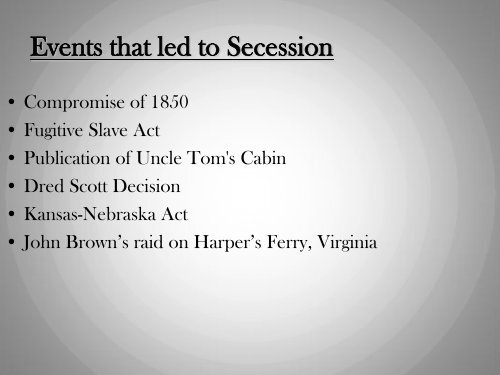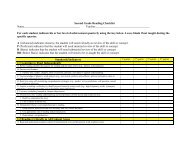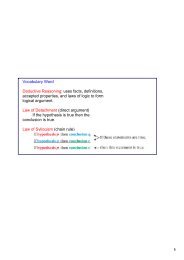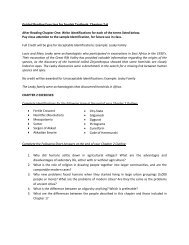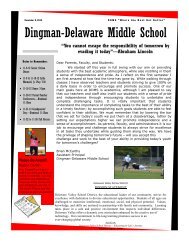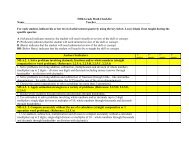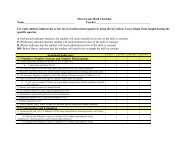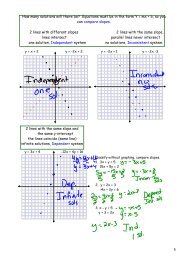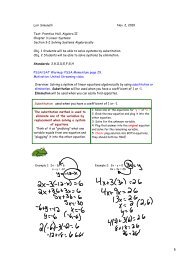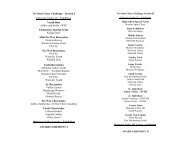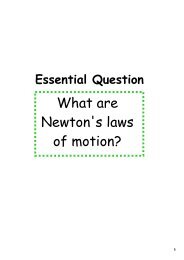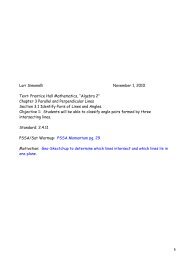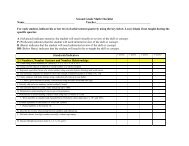Civil War Notes.pdf
Civil War Notes.pdf
Civil War Notes.pdf
You also want an ePaper? Increase the reach of your titles
YUMPU automatically turns print PDFs into web optimized ePapers that Google loves.
Events that led to Secession<br />
• Compromise of 1850<br />
• Fugitive Slave Act<br />
• Publication of Uncle Tom's Cabin<br />
• Dred Scott Decision<br />
• Kansas-Nebraska Act<br />
• John Brown’s raid on Harper’s Ferry, Virginia
Read pages118 - 120<br />
North<br />
South
North and South<br />
• Economic differences:<br />
1. The North (Union)<br />
• More Industrial<br />
– Fast paced<br />
2. The South (Confederates)<br />
• More agricultural<br />
– Laid-back
Slavery in the South<br />
• What is the significance<br />
of slavery to the South<br />
1. Plantations<br />
depended on slave<br />
labor<br />
2. The entire economy<br />
was rooted in<br />
slavery
Secession by Addition<br />
South Carolina December 20, 1860<br />
Mississippi January 9, 1861<br />
• New states entrance into<br />
the Union only fueled<br />
tensions<br />
• By 1860 - 1861, 11<br />
Southern states secede<br />
from the Union.<br />
Florida January 10, 1861<br />
Alabama January 11, 1861<br />
Georgia January 19, 1861<br />
Louisiana January 26, 1861<br />
Texas February 1, 1861<br />
Virginia April 17, 1861*<br />
Arkansas May 6, 1861*<br />
North Carolina May 20, 1861*<br />
Tennessee June 8, 1961*<br />
States = secession after the Confederate victory<br />
at Fort Sumter
Early in the <strong>War</strong><br />
1. Succession by the South,<br />
viewed simply as a “rebellion”<br />
by President Lincoln.<br />
– Non-recognition of the<br />
“Confederate States”<br />
2. Both Unionist and<br />
Confederates were eager to<br />
enlist.<br />
3. South has early success<br />
repelling and defeating against<br />
the Union.
THE AMERICAN<br />
CIVIL WAR<br />
A Nation Divided
Answer the following<br />
• Which army saw success in the early part of the war<br />
Why<br />
• What general headed the Confederate forces Who is<br />
considered his Northern equal<br />
• What did the South hope would happen as the war<br />
continued<br />
• What is the turning point of the war, from a political stand<br />
point (for the North)
1861: Confederate States vs. United States<br />
• South (Confederacy)<br />
– President: Jefferson Davis<br />
– Vice President: Alexander Stephens<br />
– *Capital: Richmond, Virginia*<br />
• North (Union)<br />
– President: Abraham Lincoln<br />
– Vice President: Andrew Johnson<br />
– Capital: Washington D.C. , Maryland
1 st Battle: Bull Run or Manassas<br />
• 1 st “major” battle of the<br />
<strong>Civil</strong> <strong>War</strong><br />
– Marked the world’s<br />
first “industrialized<br />
war”<br />
– Stunning victory for<br />
the Confederates<br />
• Spectators present<br />
during the fighting.
<strong>War</strong>time Hardships<br />
• What do you think were some of the effects of the war on the<br />
following Economies<br />
South<br />
•Food shortages<br />
•Decline in cash crop growth and harvest<br />
North<br />
•Decline in industrial production<br />
• Both sides saw men go off to war, while<br />
women began filling critical roles and jobs<br />
Click
Effects of Emancipation Proclamation<br />
1. Outlawed slavery only in the<br />
“rebel” states<br />
2. Higher rates of fugitive slaves<br />
to the North<br />
3. Enlistment by black’s into<br />
the Union Army increases!<br />
– 180,000 by 1865 (10% of<br />
Union troops)<br />
– Fighting 54 th 1863 charge<br />
on Fort Wagner –<br />
Charleston, SC.
The Bloodiest Battle of the <strong>Civil</strong> <strong>War</strong><br />
Importance of Gettysburg<br />
• The South needed to convince<br />
the federal government to permit<br />
them to secede.<br />
• How will they accomplish this<br />
1. 1863 the Northern war effort<br />
was in disarray.<br />
2. Beat the Union on their own<br />
soil<br />
3. Make the Union abandon the<br />
war.
Frederick Douglass<br />
1. One of America's “Greatest<br />
Speakers”.<br />
2. Author of his own<br />
Autobiography and The<br />
North Star.<br />
3. Abolitionist who served as an<br />
adviser to President Lincoln<br />
4. Revered today for his<br />
contributions against racial<br />
injustice.
1865<br />
1. 13 th Amendment passed<br />
Feb.<br />
2. March 1865 – Second<br />
Inaugural Address<br />
– Re-elected Nov. 1864<br />
3. April 9 : Lee surrenders to<br />
Grant - Appomattox<br />
4. April 14 1865 Lincoln is<br />
shot<br />
– Dies the next day<br />
John Wilkes Booth<br />
President Lincoln


